All You Ever Wanted to Know About Oatmeal: A Guide to Choosing, Soaking and Cooking
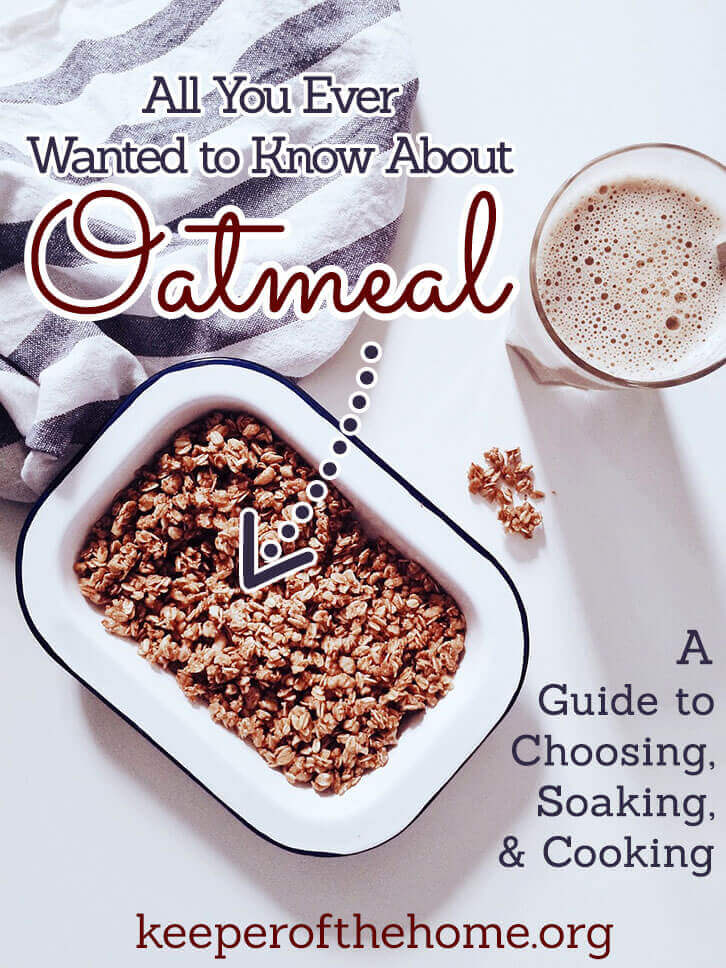
Today’s kitchen tip is a quick lesson in soaking and cooking oatmeal.
Recently, I’ve been asked multiple times what kind of oats we use, and to explain the details of how I make our breakfast cereal, so here goes…
For the longest time, we have been buying organic rolled oats in 5 lb bags from Azure. When I run out in between orders, I will buy organic rolled oats from Superstore, one of our local grocery stores, but these are a bit more processed (not quite a quick oat, but a bit more along those lines), so I prefer the Azure ones.
My next step was to make the transition to Steel Cut Oats. These retain more nutrients, and a chewier texture, and so I felt that they might be a better choice for our morning oatmeal. I also buy them in bulk from my co-op, although most grocery stores carry them as well.
The directions I give below can also be used with an alternative rolled grain, such as spelt or kamut. I recently purchased spelt flakes for the purpose of a specific diet I was on, and found that they were simple to use in place of oat flakes. The texture was slightly different, as was the taste, but the procedure remained the same.
If your desire is to use oatmeal as a healthy and frugal breakfast, (which it most certainly is!) I would highly suggest finding a good source of bulk, organic oats in whichever form you choose. Our 5 lb bags are a good deal, at $4.50 US. Now that our family is growing and we are going through them faster than ever, I was planning to start purchasing the 25 lb bag for $17.05. I think, though, that we’re going to switch and buy steel cut oats or oat groats instead, for the same price.
Oats: Defining the Options
1 ) Instant Oats— These are pre-cooked, and simply need hot water added. They have little nutrition and are fairly bland and mushy.
2) Quick Oats— These have been pre-steamed, rolled very thinly and cut into smaller pieces. They are not nearly as flavorful as other options. They are the thinnest, and thus, the mushiest.
3) Rolled Oats— These are a great middle ground. They are less processed than quick oats, thus retaining more nutrients. They are pre-steamed to make for faster cooking, but a bit thicker and larger flakes (and thus take a little longer than quick oats), but they are a bit thicker, heartier and nicer tasting.
4) Steel-Cut Oats— These are oat groats (whole oats) that have been chopped into pieces, but not cooked or rolled. They are the most nutritious, as well as the most flavorful and the heartiest. They have a great chewy texture. They take the longest to cook, but are worth the wait. They are also known as Irish Oats.
The only two options that I would really recommend to you are #3 and #4. They take only minimally more work, are not too difficult to find in stores, and are very, very well worth it. Over time, I think you will grow to enjoy their heartier taste and texture much more than quick or instant oats!
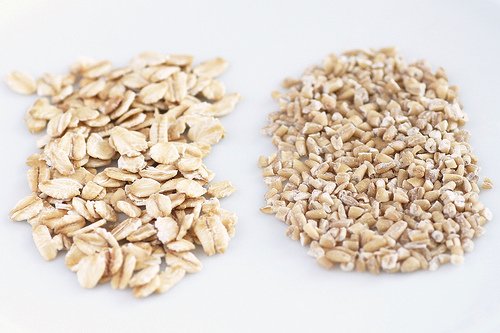
Image by little blue hen
How to Soak and Cook Oats
Soaking oats is a crucial step, especially for a grain such as oatmeal, which contain more phytates than almost any other grain. If not soaked, over time these phytates can lead to mineral losses, allergies, and irritation of the intestinal tract (source: Nourishing Traditions). Another excellent read is this post on oatmeal and phytic acid.
Since most of us eat oatmeal for breakfast, the most obvious soaking time is overnight.
After dinner cleanup, pull out the pot you want to cook your oatmeal in. Put your oats in, and add the necessary water for cooking. To this, add about a Tbsp. of an acidic liquid. This can be either yogurt, kefir, or buttermilk, whey, or even apple cider vinegar or lemon juice. Personally, I usually use yogurt, buttermilk or whey, as I find these give nice results.
Edit: I now also add a tablespoon of some type of wheat flour, and yes, kamut or spelt will work just fine in place of whole wheat. This helps to reduce the phytates even more than simply soaking the oats alone. See the above post on oatmeal and phytic acid for more on this.
You do not need to drain before cooking, and in fact, it would be rather impractical, as your oats will soak up most of the water overnight. I have heard that some find them a bit sour (from the yogurt, etc.). If this is the case for you, you could rinse and drain them I suppose, before adding a bit more water and cooking. I find this step unnecessary though, and don’t find that the taste is too sour.
When you wake up in the morning, all that is needed is to turn on the stove and cook the oats according to the type that you are eating. Because they have been soaked, you will find that they require less cooking time than usual.
General Guidelines for Cooking Oats
Rolled Oats: This is what I have made the most often, and I find these only need to be brought to a med-high heat, then turned lower to simmer with the lid on. They will be ready in about 5 minutes. Water ratio is 1 (or 1 1/2) cups of water to 1 cup of oats. Some prefer an even softer oatmeal, and if that’s you, use more like a 2:1 ratio of water instead.
Steel Cut Oats: Same procedure, but I would give these more like 10 minutes or more to simmer. Use 2 cups of water to 1 cup of oats. Again, for those who prefer an even softer oatmeal, up the water ratio to more like 3:1.
I know that many also swear by using their crockpot overnight, on low, to prepare their oatmeal. I don’t cook mine this way, but here is a recipe for trying it using steel cut oats.
Our favorite way to eat oatmeal is with raw milk or cream, a drizzle of honey (or even maple syrup as a splurge), raisins, and a sprinkle of cinnamon. It’s also good with other fruit, such as berries. I didn’t grow up eating hot cereals, and actually thought they were quite disgusting, but now I have overcome my old prejudices, and have learned to really enjoy a hot, comforting and delicious bowl of oatmeal.

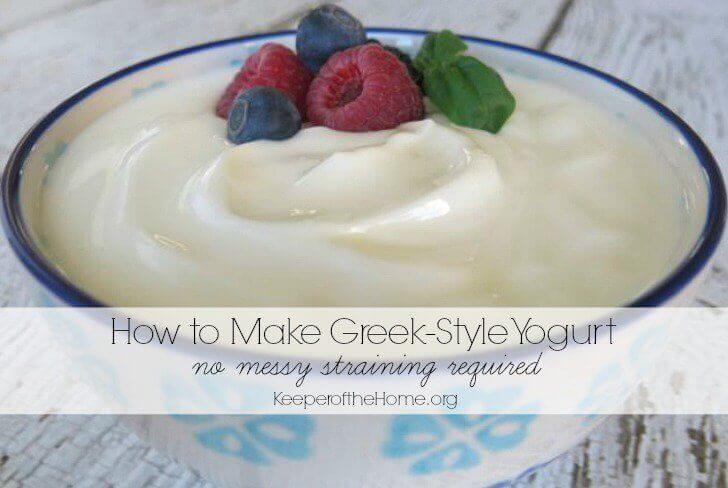

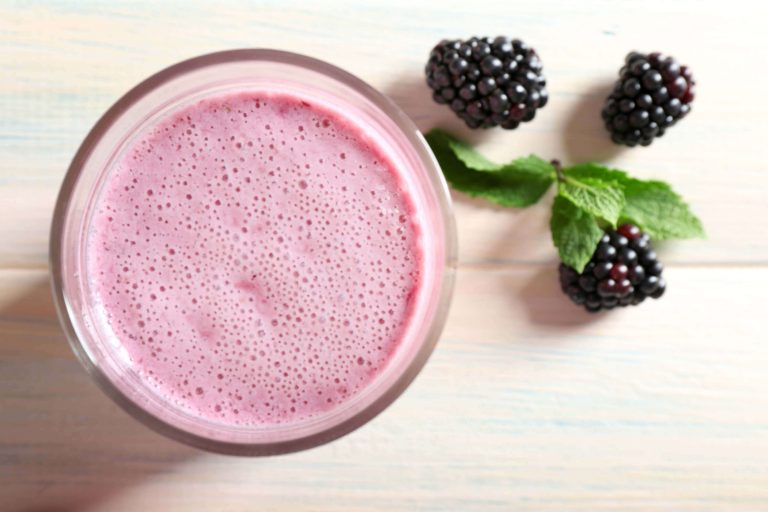

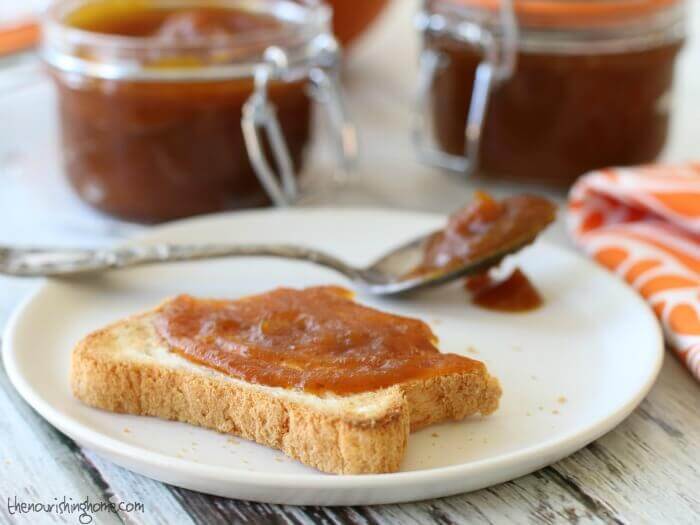
THANK YOU!! I have been looking for a good and clear explanation about how to soak oats.. and why. I very much appreciate this information.
I also buy oat groats. I have the Family Grain Mill, which I love, because you can crack the groats. Then I soak overnight, as you described. I’ve tried other grains like this too. Oats are my favorite though.
Thanks for this Stephanie, I’m trying to incorporate more oats into our meals. Could you tell me where Old-fashioned Oats fall? Is that just another name for one of the others?
Laura
PS: Do you know your feeds still aren’t working?
Old-fashioned oats are the same as rolled-oats 🙂
Thank you so much! I’ve been using Azure rolled oats, too. (I’ve also been soaking them.) But now, I will probably switch to steel cut. Thanks! 🙂
Blessings,
Michele
http://www.frugalgranola.blogspot.com
I LOVE steel cut oats! Like Laura V said, I find it difficult to eat any other kind of oatmeal now. The texture is wonderful. But *blush* I haven’t been soaking mine! I was just cooking them according to the directions in Feeding the Whole Family. Can’t wait to try them soaked now. Yay!
Where does the phytic acid go? What does it turn in to?
I am finally coming out of lurking. I am amazed how well you and your family eats and I am starting to do the same. I have lots to learn but you explain everything so well and make it seem so easy to do. Although we are limited here in the Maritimes (Canada) as far as grain selection goes I may try to pick up some next time we visit the States.
I used to do this for a little while last year. The kids complained about them being chewy but I liked them and could make a great big pot ata time and spend less than the instant packets. I’ve used those packets for so long with the kids (for convenience sake and b4 I read NT) that it’s no wonder that oats where one of the foods that they tested allergic to. I am bummed – no oats for us right now but maybe in the future if I prepare them properly again, we can all eat them again? Thanks for the info!
Thanks so much for this post! It was very helpful.
I just had one question. We have dairy allergies at our house so I was thinking of using the lemon juice for my acidic liquid but am nervous that it would give a funny taste to it. Have you tried soaking with lemon juice? Is lemon juice you buy in the bottle sufficient or should it be from a fresh lemon?
Thanks for the informative post!
LInds
I really LOVE steel cut oats. I haven’t gone back since I tried them. They have much better flavor and after they’re soaked, they cook up in a snap!
I do have one question about rolled oats. Sometimes I put rolled oats in a dish such as apple crumble (for the topping). I have never soaked them for this purpose since they need to be crispy. I was wondering if maybe I should soak them and then dehydrate them (or is that even possible)?
Also, to Linds – I use bottled lemon juice to soak all of my grains and have found that it does NOT make them bitter or alter the taste. I use about 1 Tbsp per cup of water. Then I just turn the pot on in the morning and cook them up in that same liquid. I have had no problems doing it this way.
Stephanie-
I happened upon your blog a couple of weeks ago and I can hardly peel myself away! If I didn’t have 3 children to feed(and teach! ;)) I would probably sit at my computer reading your whole blog until I was all caught up! You are a very disciplined woman! WOW! I am very interested in eating more healthy and living more healthy, so I have a question for you- is there a website that you know of that has a decent price on steel cut oats? We live in the states, however in a VERY rural area and the closest “decent” health food store is about an hour away! So, with gas prices as they are, those trips have to be made in conjunction with other needed trips! 😉 God bless you and your beautiful family!
Sincerely in Jesus Christ,
Sarah T
Thanks for the explanation on soaking oats. I was also happy to read about the difference in the oats. Truthfully, any time I ate oatmeal growing up, it was always instant oats, and I was never a fan. In the last year, I have tried to cut out processed foods and tried eating plain quick oats with added fruit, but I just couldn’t handle the texture. I am interested in trying the other forms to see if they are more pleasing to my palate!
On a side note, I have tried to subscribe to your site through Google Reader, and it’s telling me that you have not posted any items. I even refreshed my subscription from your old site to the new one. I know you are still “under construction,” but I thought I’d provide that feedback for you and see if possibly you know of any reason for the problem (like something that I need to do/change.) I love your new site, by the way!
Stephanie-
Hey! I have been loving your blog! I happened here a couple of weeks ago and have been devouring all the information you share! Thank you Thank you! I was wondering if you know of an internet store that sells steel cut oats? We live in a very rural area in the states, so going to an health food store takes an hour or so! Anyway, thank you and God Bless you and your beautiful family!
Sincerely in Jesus Christ,
Sarah T
P.S. I left a comment previously but not sure where it went! Sorry if you already got it! 😉
Laura V, thanks for a great answer to Linds’ question. As for soaking and then dehydrating oats, I’ve never tried it, but I think it’s a possibility. I’ve only sprouted then dehydrated. If you try it, wanna let me know how it works?
Sarah T, welcome! I’m Canadian, so I shop mostly here in Canada, but I do shop at one American natural foods co-op called Azure Standard (located in Oregon). They deliver mostly in the West and will ship to anywhere- it would be worth checking out their site . I’ve also heard good things about Paul’s Grains, from Iowa.
Risha, thanks for the feedback about my feed- I didn’t realize until today that there was a problem, and I am working steadily to try to fix it, but it might be a few days. Thanks, though and sorry about that!
Org Junkie, old fashioned oats are the same as rolled oats. Yep, the feeds… ah, more work to do.
Mrs. Taft- good question. I tried to look into it and the only wording that I can ever come up with is that the acid is “neutralized”- so I assume that it is still present, but altered somehow so that it is no longer inhibiting the nutrients, but releases them instead (as well as starting the digestion process of the grains). Does anyone else have a better explanation than that??? 🙂
If you are making an overnight steel cut recipe in a crockpot does that take care of the soaking too or you would still ideally need to soak before they get turned on????
Thanks!
Is it necessary to soak Quick Oats? I have so many containers of Quick Oats and I want to get them eaten up. I’ve searched the internet for some great ways to use them and come across all of this information about soaking oats. The thing is, is that most of these sites already assume you know the first thing about oats. I don’t know a thing.
1. Is it necessary to soak Quick Oats?
2. What is the healthiest way to eat Quick Oats?
3. Are there any good recipes using Quick Oats?
Hopefully you can help. Yours is the first information I’ve come across that talks to us like we don’t know the first thing about oats, which is exactly where I’m at.
Can the whey be any kind of whey protein powder??
@Josh, They whey is actually not that kind of whey, but the thin yellowish liquid that comes when you either sour and strain raw milk, or when you leave yogurt on the counter overnight and strain it through cheesecloth. If you don’t want to use whey, lemon juice works well, too.
Got it thanks for the info glad I cleared that one up!
Have you read the recent information about calcium inhibiting the phytic breakdown? I don’t remember where I read about this, but apparently the lemon/acv would be a better option than yogurt/whey if this is the case. Perhaps you could look this up, and maybe update your post with your findings? Thanks!!
@EllaJac, I haven’t heard that, EllaJac. Was that WAPF article, or did you see it somewhere else?
Thank you for this post. I never understood the difference between instant, quick, rolled, etc.
thank. you, i was so intimidated by the idea of soaking oats, and now i see its soooo easy! In the same pan, in the same water, cool!
Old post, I know 🙂 But I just came across your blog recently, and was reading some posts. In my understanding, all the processed oats (including steel cut) lose their nutrients in the same way that flour oxidizes. So within a couple days of the grain being “broken” or opened, virtually all nutrition is gone. The only thing really remaining is the fiber and starch, which are also beneficial. In order to get all the nutrients out, you would have to buy whole oat groats, and either cut them (use a food processor) to make steel cut oats, and then roll them yourself.
I do not like to cook my oats over the stove and normally just soak rolled oats in hot water for 1/2 hour while eat it with honey….. YUM !
I love the (old fashion) rolled oats. But I cannot stand eating all that starchy yuk.
So I cook it as normal, adding the oatmeal to boiling water, turn down the heat and cook for 5 min. Then I pour it all in a collander and rinse it with hot tap water. I love oatmeal this way! After I’ve rinsed it I put it in a glass bowl, I pop it in the microwave for about 1 min. and its nice and hot again, light and fluffy like rice. I eat oatmeal this way almost everyday, and sometimes I make up extra, and after its rinsed I just put it in air tight container and refridgerate it. It lasts for several days this way, the next day I can take out what I want and heat it up in the microwave. Yummy!!
I usually cook oatmeal with milk instead of water. I want to try soaking them but I was wondering if I could use milk to soak them in, instead of the water. I’m really likeing your blog and trying to change my familys eating habbits more healthier:)
Thanks,
Rosie
I suppose if it was raw milk, you could soak it overnight. Of course, not if you’re using pasteurized milk, for safety reasons. You can’t soak it in the fridge or it won’t really have the same soaking effects- it needs to be at room temperature. That’s why it’s typically best to stick with water and just add a bit or yogurt or kefir. I love that you’re working on healthier eating habits- way to go ! 🙂
So you can add in yogurt and leave it out overnight?
Hey Stephanie!
I have rolled oats, sunflower seeds and pumpkin seeds for breakfast. I eat them with almond milk. Should I soak them in them all in the almond milk overnight, because if I soaked them in water and replaced the water with almond milk in the morning, some water-soluble nutrients might get lost, migth’t they?
Thanks!
I would just soak in the almond milk. If you don’t mind the taste, you could add just a bit of lemon juice or apple cider vinegar to raise the acidity a little.
Is there a maximum soaking time?
Just wondering if anyone else has soaked/cooked oatmeal in apple juice?
Ok here is a strange question for you. I love steel cut oats, but I always rinse them after they are cooked to remove that creaminess/sliminess. It makes it really yummy with yogurt.. My question is, am I rinsing away the soluble fiber as well as the iron? Any ideas? And does anyone else do this with their steel cut oats?
Hi there! This is an amazing, informative post. I was just wondering….have you ever tried or would you recommend adding a tablespoon of sourdough starter to the oatmeal the night before? Do you know if it would help with the break down of the anti-nutrients?
OR….you could go to your local farmer and buy a 50 Pound! bag of whole oats for about $8 buckssss, and chop them yourself!
If you cannot eat wheat is there something else to use to soak the oats that will decrease the phytates?
Just do the soak with an acid medium (whey, lemon juice, yogurt, apple cider vinegar) and not with the flour. You will get more of the phytates if you keep your soaks on the longer end (rather than just 8-12 hours). Aim for more like 12-24 hrs.
i read buckwheat
I have been soaking/sprouting for awhile but I still don’t understand this: if you soak the phytic acid out into the water, then cook with it, aren’t you still consuming it?
My understanding is that soaking breaks down the enzyme – deactivating it – so it is then safe to consume.
Stephanie, I love Irish oats but have a question regarding the oats “after cooking.” Do you rinse the oatmeal after it is cooked or does that remove all the nutrition?
I have a question about soaking and oatmeal. Current studies on oatmeal show that it binds with cholesterol , lowering your cholesterol #’s, ( I have not read these studies, I am just repeating what I heard, )and is therefore very “healthful”. My thought is that no one in these studies soaked the oats because this is not the common method these days. So here is my question. Would soaking change that binding- with- the- cholesterol factor?
You make several nutrition statements about oats in this article. Where are you getting your information from?
I have to suggest you may be just assuming that nutrients automatically leak out when an oat grain is smashed (rolled) or cut into small pieces that cook faster. Looking at nutritional statements and analysis seems to paint a very different picture than you present.
Also, I must dispute your assertion that rolled oats and quick oats are “pre-steamed”. If you look at actual product descriptions from oatmeal distributers you will not find anything about “pre-cooking” or steaming. Bob’s Red Mill very specifically states that quick oats are not pre-cooked. They are just rolled thinner for faster cooking.
You are correct about texture, which is where the real differences lie (other than cooking time) between steel-cut (pinhead), rolled, or quick oats. Individual preference will determine which type of oatmeal presentation a person likes.
As far as instant oatmeal goes, again you seem to be assuming that a commercial company pre-cooking the grains will deplete nutritional value more readily than a person cooking in their own kitchen. I’m not sure how you can substantiate this claim, since the commercial cooking process uses high-end commercial equipment far superior to anything found in a home kitchen. The more concerning part, I believe, should be what is added to instant oatmeal vs. nutritional value of the oats themselves. This can only be determined on a brand-by-brand basis.
I have a question about soaking oatmeal to release the phytates. If you do not drain and rinse the oats, aren’t you consuming the phytates that are released into the water? Just wondering.
Thanks!
I’m wondering the same thing and see elsewhere to drain and rinse before cooking. Stands to reason.
i am allergic to acids (like lemon and vinegar), dairy and wheat.
Will the phytates be neutralized if I soak the oatmeal in plain water?
Can she use non-dairy acidophilus tablets?
Can the wee plastic jif lemon be used to soak oats or does it have to be fresh lemons and if so is it still a tablespoon?
I hope you can answer this. I have the same question someone else posted here back in 2009 (post by Lesa) but I couldn’t find a response here in the comments. Your article is the only one I’ve come across about the different types of oatmeal. The question is: do I need to soak quick oats? Sorry, I was a bit confused on the article if you meant all the different type of oats need to be soaked or just #3 and #4 (the Rolled and Steel Cut Oats). I eat Organic Sprouted Quick Oats and just follow the directions. It doesn’t say anything about soaking. Thank you.